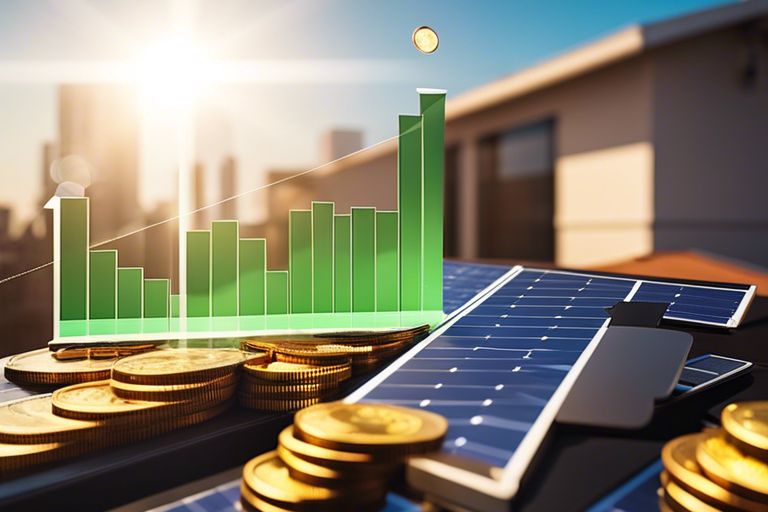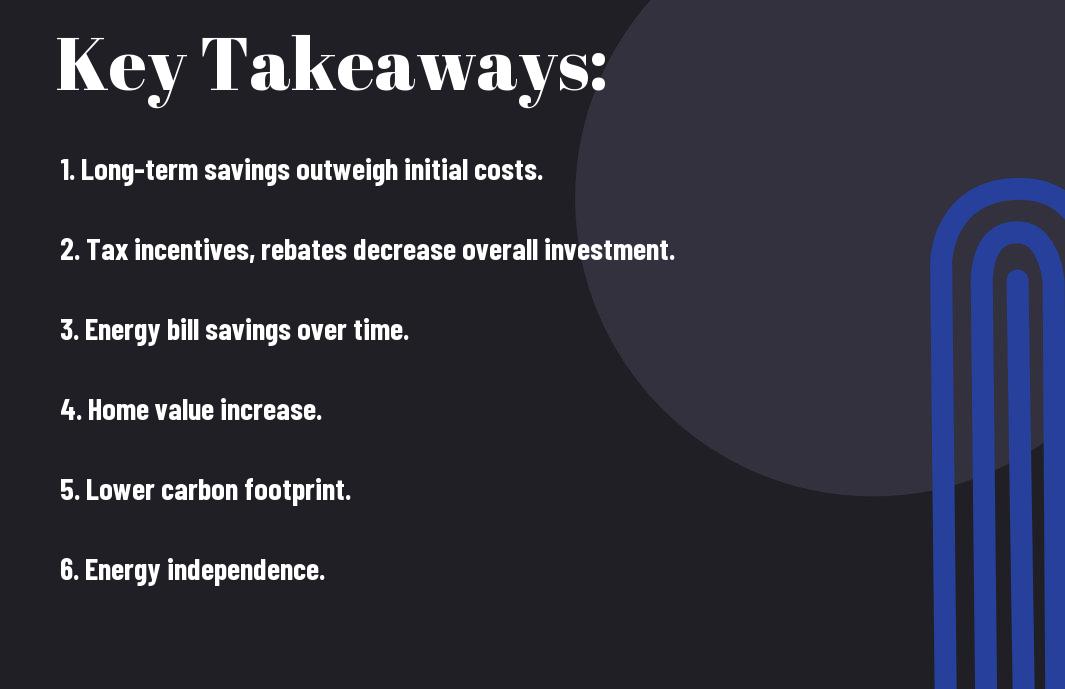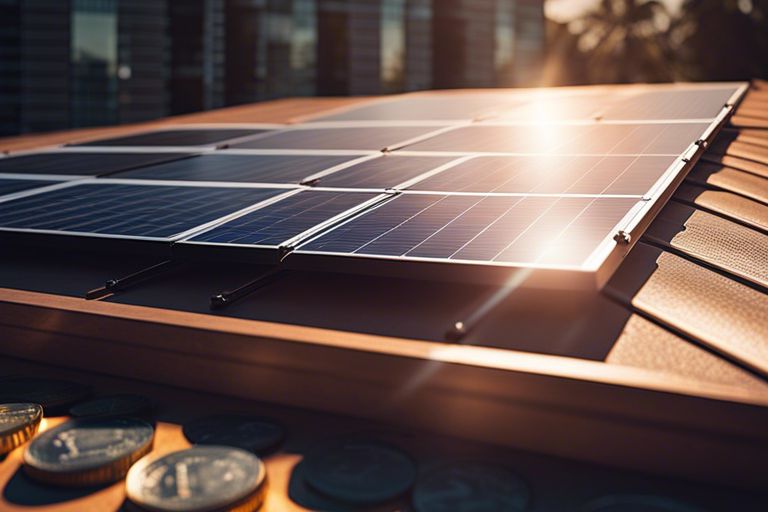It’s a question that many homeowners like yourself may be pondering – is investing in solar energy financially worthwhile? In this informative piece, we will examine into the intricacies of solar panel installation, cost savings, government incentives, and long-term financial benefits, helping you make an informed decision about whether going solar is the right choice for your home. So, before you dismiss the idea, let’s explore whether the sun can shine bright on your finances.

Key Takeaways:
- Solar panels can provide long-term financial benefits: Investing in solar panels can lead to significant savings on monthly energy bills over time, making it a financially wise decision.
- Government incentives and rebates can make solar more affordable: Many governments offer tax incentives, rebates, and other financial benefits to encourage the adoption of solar energy, making it more affordable for homeowners.
- The financial return on solar investment varies depending on location and energy usage: Factors such as sunlight availability, energy rates, and the size of the solar system can impact the financial viability of installing solar panels. It’s vital to consider these factors when assessing the financial benefits of going solar.

The Cost of Solar
Initial Investment
Your initial investment in a solar panel system can vary based on the size of your home, the amount of sunlight it receives, and your energy consumption habits. On average, the upfront cost of purchasing and installing solar panels can range from $15,000 to $25,000 for a typical residential property. While this may seem like a substantial amount, it’s important to consider the long-term savings and benefits that solar energy can provide.
Ongoing Expenses
On top of the initial investment, you may have ongoing expenses related to maintaining your solar panel system. These expenses can include occasional repairs, monitoring services, and insurance costs. However, these expenses are generally minimal compared to the savings you can enjoy on your electricity bills over time.
For instance, while you may need to replace an inverter or fix a panel occasionally, the overall maintenance costs for a solar panel system are relatively low. Additionally, most systems come with warranties that can cover these expenses for a certain period, giving you peace of mind regarding unexpected costs.
Savings and Incentives
Reduced Energy Bills
If you are wondering whether solar is worth it financially, consider the long-term savings on your energy bills. By generating your electricity from the sun, you can significantly reduce or even eliminate your monthly energy costs. An investment in solar panels can save you thousands of dollars over their lifespan, making it a financially savvy decision.
Government Rebates and Tax Credits
Credits
It’s important to take advantage of government rebates and tax credits when considering the financial benefits of solar energy. Many governments offer incentives to encourage homeowners to switch to renewable energy sources like solar power. These rebates and credits can help offset the upfront costs of installing solar panels, making the investment more affordable for you.
Net Metering Benefits
Benefits
Plus
Increased Property Value
To find out if solar is worth it financially, you might be wondering about the impact it can have on your property value. According to a discussion on “Was Solar worth it? : r/solar,” many homeowners have seen an increase in the value of their homes after installing solar panels. This can be a significant factor to consider when evaluating the financial benefits of going solar.
Boosting Your Home’s Worth
Property values tend to increase with solar panel installations due to the added sustainable and energy-efficient features they bring to a home. Appraisers often take these factors into consideration when assessing the value of a property, which can result in a higher appraisal for homes with solar panels. Not only does solar energy reduce your utility bills, but it also enhances the overall appeal and desirability of your home in the real estate market.
Attracting Eco-Friendly Buyers
Increased demand for environmentally friendly homes has made properties with solar panels more attractive to eco-conscious buyers. By investing in solar energy, you not only benefit from lower energy costs but also appeal to a growing market of buyers looking for sustainable housing options. This can potentially lead to a faster sale and higher resale value for your home in the future.
Understanding the potential increase in property value and the appeal to eco-friendly buyers can help you make a more informed decision when considering the financial implications of going solar. By looking at the bigger picture of how solar can impact your home’s worth and marketability, you can evaluate whether the investment aligns with your long-term financial goals.

Environmental Impact
Now, let’s consider the environmental impact of installing solar panels on your property. By harnessing the power of the sun to generate electricity, you can significantly reduce your carbon footprint and lessen your dependence on fossil fuels.
Reducing Carbon Footprint
An important benefit of solar energy is its ability to lower carbon emissions. Traditional energy sources like coal and natural gas release harmful greenhouse gases into the atmosphere when burned for electricity. By choosing solar power, you can help combat climate change and contribute to a cleaner, greener planet.
Supporting Renewable Energy
Environmental sustainability is a key factor to consider when evaluating the worth of solar panels. By investing in solar energy, you are not only reducing your own carbon footprint but also supporting the growth of renewable energy sources. This contributes to a more sustainable energy future for everyone.
Carbon emissions from traditional energy sources are a major contributor to global warming and climate change. By transitioning to solar power, you can play a part in reducing these harmful emissions and promoting a cleaner environment for future generations.
Maintenance and Durability
Despite the initial installation costs of solar panels, one of the most appealing aspects of this renewable energy source is its low maintenance requirements. Solar panels are durable and typically only require occasional cleaning to ensure optimal performance. With no moving parts, the risk of mechanical failures is minimal, reducing the need for frequent repairs.
Low Maintenance Requirements
Durability is a key feature of solar panels. Once installed, they can withstand various weather conditions, including rain, snow, and hail. The materials used in solar panels are designed to be long-lasting and require little to no maintenance over their 25-30 year lifespan. This means you can enjoy the benefits of solar energy without the ongoing hassle and costs associated with frequent upkeep.
Long-Term Performance
Durability plays a significant role in the long-term performance of solar panels. Solar technology has advanced significantly in recent years, improving efficiency and longevity. This means that your solar panels are likely to maintain their performance levels for decades, providing you with a reliable source of clean energy for years to come.
Maintenance:
Despite the initial installation costs of solar panels, one of the most appealing aspects of this renewable energy source is its low maintenance requirements. Solar panels are durable and typically only require occasional cleaning to ensure optimal performance.
Comparing Solar to Traditional Energy
Once again, let’s compare solar energy to traditional sources like coal or natural gas. Below is a breakdown of the key aspects in a table:
| Solar Energy | Traditional Energy |
| Renewable and sustainable | Non-renewable and finite |
| Low operating costs | High operating costs |
| Reduced carbon footprint | Higher carbon emissions |
Cost Comparison
Comparison of the cost between solar and traditional energy sources can be crucial in making a decision between the two:
| Initial Investment | Running Costs |
| Solar panels require a higher upfront cost but have lower maintenance expenses over time. | Traditional energy sources often have lower initial costs but higher ongoing operating expenses. |
Energy Independence
Energy independence is another factor to consider when weighing solar against traditional energy sources.
Energy: Solar energy provides you with independence from utility companies and fluctuations in energy prices.
Independence: By having your own solar energy system, you can generate your electricity and become less reliant on outside sources for your power needs.
Summing up
Taking this into account, when considering whether solar power is financially worth it for you, it’s imperative to weigh the initial investment against long-term savings. While the upfront costs may seem daunting, the potential for substantial savings on your energy bills in the future could make it a wise financial decision. Additionally, with increasing environmental awareness and incentives for renewable energy, investing in solar power not only benefits your wallet but also the planet.
Q: Is solar worth it financially?
A: The financial benefits of solar power depend on various factors such as the cost of installation, local incentives, energy savings, and the duration you plan to stay in your current home. Generally, solar panels can provide a good return on investment over time by significantly reducing or eliminating monthly electricity bills.
Q: How do I know if solar is a good investment for my home?
A: To determine if solar is a good financial investment for your home, consider factors such as your current electricity usage, available sunlight in your area, potential savings on utility bills, government incentives or rebates, and the cost of solar panel installation. It is recommended to consult with a solar energy provider or financial advisor to assess the feasibility and benefits for your specific situation.
Q: What are some financial incentives for installing solar panels?
A: There are various financial incentives available for installing solar panels, including federal tax credits, state and local rebates, net metering programs, Solar Renewable Energy Certificates (SRECs), and financing options such as solar loans or leasing agreements. These incentives can help offset the initial cost of solar installation and improve the financial returns of generating your own clean energy.
